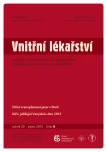-
Medical journals
- Career
Biliary (cholestatic) complications in the liver graft biopsy samples early after transplantation
Authors: E. Honsová
Authors‘ workplace: Pracoviště klinické a transplantační patologie, Transplantcentrum IKEM Praha, vedoucí pracoviště prim. MU Dr. Eva Honsová, Ph. D.
Published in: Vnitř Lék 2013; 59(8): 689-693
Category:
Overview
During the first three months after a liver transplant, cholestasis of various type and degree represents 1 of the most frequent morphological findings in liver graft biopsies. The morphology of cholestasis is typical for all conditions with bile duct impairment but also for other conditions with more severe impairment of hepatocytes, including rejection and recurrence of viral hepatitides. Histological diagnosis represents the gold standard in addressing liver graft dysfunction causes, and in the majority of cases it allows for distinguishing between the main categories of diseases resulting in cholestasis. Usually a combination of various changes can be identified as a cause of the liver graft dysfunction early after transplantation. Therefore, the interpretation of limited morphological characteristics, which usually represent a certain type of tissue reaction, not the cause, is complicated. The close cooperation between the hepatologist and pathologist has become a necessary prerequisite for the best possible interpretation of the morphological conclusion.
Key words:
liver transplant – cholestasis – biliary complications
Sources
1. Zhai Y, Busuttil RW, Kupiec - Weglinski JV. Liver ischemia and reperfusion injury: new insights into mechanisms of innate‑adaptive immune - mediated tissue inflammation. Am J Transplant 2011; 11 : 1563 – 1569.
2. Hübscher S. Antibody-mediated rejection in the liver allograft. Curr Opin Organ Transplant 2012; 17 : 280 – 286.
3. Kusumoto S, Tanaka Y, Mizokami M et al. Reactivation of hepatitis B virus following systemic chemotherapy for malignit lymphoma. Int J Hematol 2009; 90 : 13 – 23.
4. Honsová E, Sperl J. Fibrocholestatická hepatitida, onemocnění nejen transplantovaných pacientů. Cesk Patol 2011; 47 : 55 – 58.
Labels
Diabetology Endocrinology Internal medicine
Article was published inInternal Medicine

2013 Issue 8-
All articles in this issue
- 30 years of liver transplants in Brno
- Liver transplant indication and waiting list inclusion
- Liver transplant outcomes in Brno
- Development of immunosuppressant treatment after liver transplant
- Immunosuppression after liver transplant, now and in future
- Deceased organ donors, legal regulations governing diagnosis of brain death, overview of donors and liver transplants in the Czech Republic
- Surgical techniques to counter the lack of donors
- Interventional radiology options to address certain complications of the orthotopic liver transplant
- Biliary (cholestatic) complications in the liver graft biopsy samples early after transplantation
- Liver transplants in viral hepatitides
- Liver transplants in tumours and alcoholic cirrhoses
- Cardiorenal syndrome by heart failure
- New drugs in type 2 diabetes mellitus therapy
- Where is the treatment of hypertension heading?
- Renal denervation 2013
- The strategy of the Czech Society for Oncology of the Czech Medical Association of J. E. Purkyně for the organisation of oncological care in the Czech Republic
- Metformin: the overlap of diabetology and oncology
- Colitis precipitated by Clostridium difficile – a serious current problem
- Recent possibilities of treatment of End Stage Renal Desease
- Internal Medicine
- Journal archive
- Current issue
- Online only
- About the journal
Most read in this issue- Liver transplants in tumours and alcoholic cirrhoses
- Immunosuppression after liver transplant, now and in future
- New drugs in type 2 diabetes mellitus therapy
- Liver transplant indication and waiting list inclusion
Login#ADS_BOTTOM_SCRIPTS#Forgotten passwordEnter the email address that you registered with. We will send you instructions on how to set a new password.
- Career

